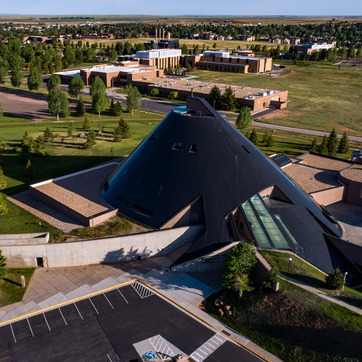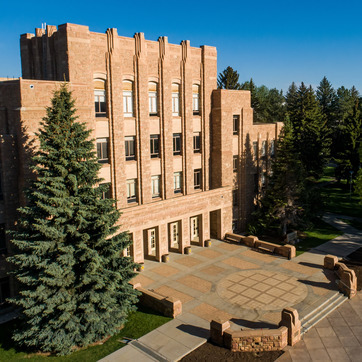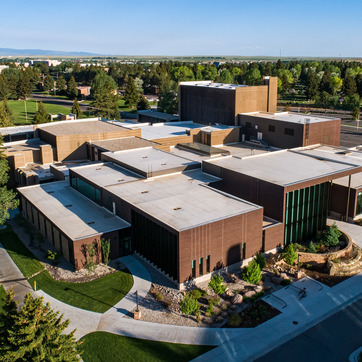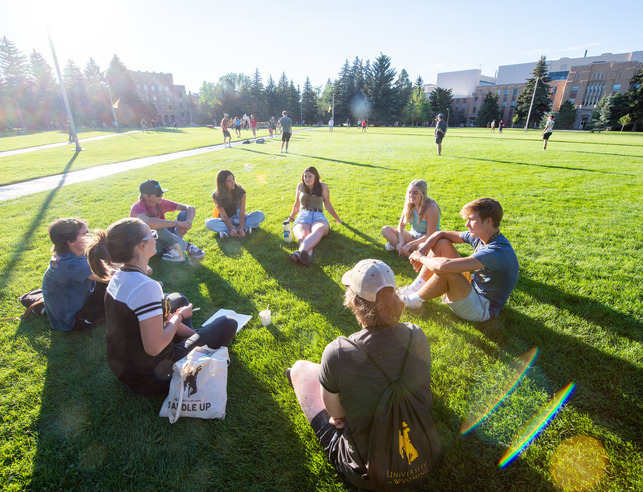Scholarships
Undergraduate students at the University of Wyoming may qualify for scholarship support to help finance your education. Most scholarships are based upon your merit when initially starting at UW, but there are some other opportunities based upon your financial need.
Graduate students may qualify for graduate assistantship opportunities through the School of Graduate Education.
Federal Grant Programs
The U.S. Department of Education’s offers several federal grants to students. These grants are awarded only to students who demonstrate financial need as determined by the FAFSA. Grants generally do not need to be paid back except under certain circumstances when withdrawing from one or more courses after funds have been disbursed.

These are federal grants made to eligible undergraduate students who demonstrate financial need on the FAFSA and have not earned a bachelor’s degree yet. You may not receive Pell Grant funds from more than one school at a time.
Students can receive a pro-rated amount of Pell Grant if they are enrolled in less than full-time hours. Pell Grants are not affected by other aid and may be available to you for enrollment in summer semester; however, there is a Lifetime Eligibility Used (LEU) limit on the amount of Pell Grant funds you can receive in total that may impact that.
Effective July 1, 2023, Pell Grant eligibility was restored for confined or incarcerated students enrolled in an eligible Prison Education Program.
Starting in the 2024-2025 aid year, the FAFSA Simplification Act replaced the Iraq and Afghanistan Service Grant (IASG) and Children of Fallen Heroes (CFH) with the Special Rule for Pell Grants. This allows students under 33 years of age, whose parent or guardian died in the line of duty, to receive a maximum Pall Grant, regardless of FAFSA SAI (Student Aid Index). Financial Aid Administrators must certify eligibility for this grant.
These are federal grants made to eligible undergraduate students who demonstrate exceptional financial need on the FAFSA and have not earned a bachelor's degree yet. Limited funds exist each year, so awards are generally restricted to qualifying applicants who complete the FAFSA by priority deadlines and are awarded on a first-come, first-served basis. Priority is given to students who also receive a Pell Grant; however, students who do not receive a Pell Grant may still be eligible for a FSEOG if funds remain after Pell Grant recipients have been awarded.
These are federal grants made to eligible undergraduate students who are completing, or plan to complete, coursework that is required to begin a career in teaching that is a TEACH Grant eligible program, and who agree to:
- teach full-time for at least four (4) years at either an elementary or secondary school;
- teach at a school or educational service agency that services low-income students;
- teach in a high-need field as defined by the Department of Education; and
- complete the four years of teaching within eight years after you graduate from the institution where you received TEACH Grants.
If a recipient of this grant does not complete the teaching service obligation, all amounts of TEACH Grant you received will be converted to a Direct Unsubsidized Loan that the student must repay, with interest, to the Department of Education. You will be charged interest from the date the grant(s) was disbursed.
Students interested in this type of grant should review all the details and requirements of the program using the link provided above.
Federal Work-Study Program
The U.S. Department of Education offers the Federal Work-Study Program (Work-Study) to undergraduate and graduate students who demonstrate financial need as determined by the FAFSA. Work-Study allows students part-time employment opportunities while they are enrolled in school to earn money to help pay educational expenses. The program is available to undergraduate, graduate, and professional students who are enrolled at UW either part– or full-time. Limited funds exist each year, so awards are generally restricted to qualifying applicants who complete the FAFSA by priority deadlines (February 1st) and are awarded on a first-come, first-served basis.
The award will be a part of a student’s financial aid package. If you decline to accept your Work-Study award, you may have the option of converting your Work-Study to a loan if you have remaining loan eligibility.

Once you have accepted the award, you will need to review and apply for Work-Study positions through the UW Human Resources website. Students who secure a Work-Study position will receive an hourly wage determined by the department you are working for and the skills required, but it will not be less than the federal minimum wage. Part-time employees are paid every two weeks, and a schedule of these pay periods can be found on the UW Payroll website.
Students will be required to keep track of their time and enter it into the WyoCloud/HCM System, and supervisors will be required to approve all entered time before your paycheck will be processed. Paychecks are either directly deposited into your bank account or mailed to the address you have on file. Direct Deposit is the preferred method, and you can complete/submit a Direct Deposit Form to Payroll.
If you were not offered a Work-Study award, and you would like to be considered for the program, please add your name to the Work-Study Waitlist by completing the survey. If funding is available, we will begin awarding students from the waitlist no sooner than the 4th week of the semester (fall and spring). You will be contacted through your UWYO email if you qualify and receive a late Work-Study offer, and you will still be required to secure a Work-Study position.
If you are not eligible to receive Work-Study, but still wish to be employed part-time on campus, you can apply for those non Work-Study positions through the UW Human Resources website. The payroll process will be identical to that listed in the section above for Work-Study positions.
Federal Direct Loans
The U.S. Department of Education’s federal student loan program is the William D. Ford Federal Direct Loan (Direct Loan) Program. Under this program, the Department of Education is your lender for the different types of loans below. Students or parents will apply for these loans at studentaid.gov after the FAFSA is completed. All Direct Loans must be paid back with interest and all have a fixed interest rate determined by the Department of Education annually on July 1st. Additionally, a small loan fee is applied to all Direct Loans, which is calculated as a percentage of the loan amount and deducted from each loan disbursement.

These loans are offered to eligible undergraduate students who demonstrate financial need as determined by the FAFSA, and the amount offered cannot exceed a student's calculated need. The federal government does not charge interest on subsidized loans while you are enrolled at least half-time or during the six-month grace period (see the Loan Repayment section below). These types of loans are only available to students seeking an undergraduate degree.
Accepting Loans: If you accept a Direct Loan, you must complete a Master Promissory Note and Student Loan Entrance Counseling (new borrowers only). You do not have to accept the full amount of the loan that is offered; you can accept a lower amount in WyoRecords. If you decline a loan, it is canceled; however, if you change your mind later, it may be able to be re-offered to you within the same academic year. There are annual and aggregate student loan limits that will determine your eligibility.
These loans are offered to eligible undergraduate, graduate, and professional students, but eligibility is not based on financial need. Interest begins accruing once the loan is disbursed.
Accepting Loans: If you accept a Direct Unsubsidized Loan, you must complete a Master Promissory Note and Student Loan Entrance Counseling (new borrowers only). You do not have to accept the full amount of the loan that is offered; you can accept a lower amount in WyoRecords. If you decline a loan, it is canceled; however, if you change your mind later, it may be able to be re-offered to you within the same academic year. There are annual and aggregate student loan limits that will determine your eligibility.
These loans may be available to parents of undergraduate students to help pay for expenses not covered by other financial aid. Eligibility is not based on financial need, but a credit check will be conducted. Borrowers who have an adverse history must meet additional requirements to qualify.
The maximum PLUS loan amount you can borrow is the Cost of Attendance minus any other financial assistance they receive at UW. The funds will be applied to the student’s charges, and parents determine who the school pays any credit balance to (the student or themselves). Deferments are available, upon request, while the student is in school and for up to 6 months after.
Accepting Loans: If you as the parent apply for a Direct PLUS Loan, you must complete a Master Promissory Note (new borrowers only).
These loans may be available to graduate and professional students to help pay for expenses not covered by other financial aid. Eligibility is not based on financial need, but a credit check will be conducted. Borrowers who have an adverse history must meet additional requirements to qualify.
Accepting Loans: If as a graduate student you accept a Direct PLUS Loan, you must complete a Master Promissory Note and Student Loan Entrance Counseling for this type of loan (new borrowers only). The maximum PLUS loan amount you can borrow is the Cost of Attendance for your program minus any other financial assistance you receive at UW.
There are loan limits to how much students can borrow with a Direct Loan each academic year (annual loan limits), as well as the total amounts you can borrow for undergraduate and graduate study (aggregate loan limits). The actual loan amount awarded that you are eligible to receive each academic year may be less than the annual loan limit.
Students have a six-month grace period before repayment starts after you graduate, drop below half-time, or leave school entirely. A requirement prior to repayment beginning is to complete Direct Loan Exit Counseling.
Repayment and deferment options are available on FSA's website. When repayment begins, you will make your payments to the federal government via a student loan servicer. You can use the Loan Simulator to estimate your monthly loan repayment amount, and you can also see the different payment plan options.
PRivate Student Loans
These types of loans are typically considered after you have exhausted other financial aid options, including scholarships, grants, and federal student loans.
Problem Resolution - Ombudsman's Office
If you are having a problem related to your loan, and you are unable to resolve that problem successfully with UW, you may contact the Ombudsman’s office in the U.S. Department of Education. A representative of that office will research your situation, help you to understand the loan process and requirements, and intervene on your behalf should that become necessary.
U.S. Department of Education
FSA Ombudsman Group
PO Box 1854
Monticello, KY 42633
Phone: 1-800-433-3243
Fax: 606-396-4821


